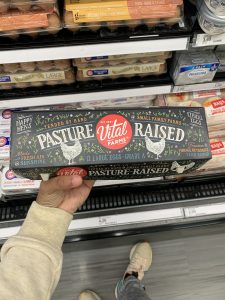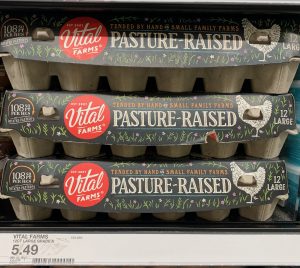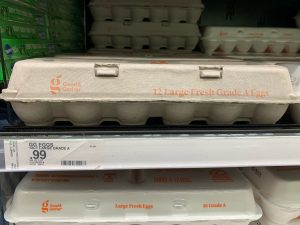Problematic Production
The Organic Industry: Not as Sustainable as You Think
Anoop Chinthala
Imagine you are walking down the aisle of your favorite grocery store and you see two egg cartons: one is 99 cents for a dozen and the other is $5.49 a dozen. The 99 cent dozen is just labeled “Eggs” and the $5.49 is labeled “Cage-Free” “Organic” “Pasture Raised” “Hormone Free” Eggs. What do these labels mean?

Are these “Organic” eggs better for me than the 99 cent dozen? Are the 99 cent dozen harmful to my body? As a result of this confusion most of us decide to spend the money on the organic eggs because we are afraid of the risk associated with conventional foods. There has been a drastic increase in the demand for organic food. According to Harvard Health Publishing, “Demand for organic food is up, with sales reaching $35.9 billion in 2015,” (Harvard Health, 2015). Some of the increase in demand for organic food can be attributed to the increase in exposure and transparency of conventional farming. As we learn more about the negative impacts conventional farming has on our environment, we seek an alternative. The popular alternative is organic farming, but just like with conventional farming, there seems to be some missing information. The debate of “organic” food vs conventional food has been a long, polarized debate with still little information given to the public. Seeing all these labels makes us believe that organic eggs are healthier and, therefore, organic farming is better for the environment, but is that really the case? This article will look at one of the most popular reasons people go organic: it is “better for the environment”. Let us begin to dive in to the world of organic food and farming and compare the information marketed to us versus the actual data.
The Downfall of Conventional Farming
It is important to distinguish organic food and farming from conventional food and farming to better understand misconceptions surrounding the organic industry. Conventional or “industrial” farming is characterized by the use of synthetic products to enhance production. Organic farming is characterized by the farming of crops or livestock without the use of synthetic chemicals, synthetic fertilizers, synthetic pesticides, plant growth regulators, and genetically modified organisms.
Just by reading the definitions of organic and conventional farming, it appears organic farming paints a more sustainable picture considering the negative connotation associated with using synthetic products in food production. It is true that the use of synthetic fertilizers and chemicals have led to food safety problems by contaminating nearby streams, rivers, lakes, etc or downstream agriculture fields (Nesheim, 2015). The contamination of nearby bodies of water is known as chemical runoff and is a negative environmental cost of conventional farming methods. Chemical runoff, greenhouse gas emissions, depletion of natural resources, and many other environmental effects have been tied to conventional farming. Documentaries such as Food, Inc. and Cowspiracy have highlighted these problems and pointed its finger at conventional farming, rightfully so. However, in many of these documentaries, they follow up with organic farming as the solution to save our environment. It is crucial to mention that organic does not imply chemical-free, or pesticide free. Organic farming still utilizes chemicals and pesticides however these cannot be synthetically made (Ritchie, 2017). I believe the question of whether organic farming uses chemicals or not is where the first misconception lies in organic food. Without reading the “fine print”, it is easy for organic agribusiness to market their food as free of chemicals and pesticides to the public when in fact, they are only free of synthetic chemicals and pesticide. As a result of misleading information in regards of what is used in organic farming, people believe organic food is significantly better for the environment than conventional food.
A New Alternative?
Due to the rise of public scrutiny of conventional foods and farming, everyone is searching for an alternative food system. Something that doesn’t harm the environment, surrounding communities, and the people. Organic farming does have numerous advantages and conceptually sounds better than conventional farming. However, it is not without its faults. The biggest concern surrounding organic farming is whether it is actually sustainable. Because organic farming does not use synthetic fertilizers, crop yield is 25% lower compared to conventional farming (Zimmerman, 2020). As a result, an increase in the amount of land is required to produce current yields. The requirement of more land raises the question whether organic farming would be able to keep up with the increasing food demand as the world population continues to increase. For industrialized countries, it may not actually be sustainable to fully convert to organic farming. A study in the journal Nature Communications found that conversion to organic farming practices in England and Wales led to increases in greenhouse gas emissions (Varanasi, 2019). The increase of emissions is due to lower yield experienced by organic farming and in order to meet demands, more food supplies would have to be imported and more resources are used to supply the larger farmlands. Increasing farmlands could lead to even more deforestation and other methods of clearing land which are harmful to the environment because of the green house gas emissions produced while clearing the land.
Additionally, organic farming needs to incorporate other methods to control pests and weeds since they are not able to use many pesticides as many are synthetic. One such method is laying down sheets of black plastic over soil surrounding crops to accelerate plant growth and preventing erosion (Zimmerman, 2020). This method also saves water by allowing drip irrigation but creates large amount of plastic waste. Another common method used in organic vegetable farming is propane-fueled flame weeding, a way of controlling weeds and pests. Propane-fueled flame weeding increases the energy cost and actually results in higher energy expenditure compared to conventional vegetable farming (Ritchie, 2017). In order to supply nitrogen to the soil, organic farming must utilize manure instead of synthetic fertilizers. The shift to manure is beneficial to the environment as chemical runoff is decreased, but it does not mean it is completely gone. Fertilizers release their nutrients to crop demands while manure releases its nutrients depending on environmental and weather conditions. As a result, nutrient release from manure is not timed efficiently to match with crop demands and excess nutrients can run off into nearby rivers and water supplies still causing pollution to nearby bodies of water and communities (Ritchie, 2017). Although it is not as severe as conventional farming, it still occurs and is harmful to the environment. It is very easy to point our finger at conventional farming methods and blame them for our environmental problems, but these issues caused by conventional farming methods would still exist with organic farming. Some consequences would occur to a lesser degree, such as chemical run off, but new consequences would rise such as land usage and keeping up with food demand. These new consequences beg the question: if organic farming isn’t significantly better for the environment than conventional farming, why else would people buy organic food?
Deception of Quality
Many people purchase organic items because they believe it is of a higher quality. It is true that organic food can be at a higher quality, for example organic chicken vs conventional chicken, but ultimately is not the case. The quality misconception is not created by the public, but is marketed by organic agribusinesses as the main selling point for their food items and is further perpetuated by the unclear guidelines set by USDA. Products that carry the “USDA organic seal” are thought to be 95% organic, as these products are only approved if the farms meet the USDA organic guidelines. However, the process of obtaining the USDA organic seal isn’t so black and white. the process of obtaining the USDA organic seal isn’t so black and white. Being able to obtain the USDA’s organic certification is highly costly and is a bureaucratic process. Naomi Zimmerman, an environmental science and economics student at Barnard stated,“This can act as a barrier to many small farms, which may not use synthetic pesticides or fertilizers, and may even implement other sustainable practices that go far beyond requirements set by the USDA,” (Zimmerman, 2020). One example is that the USDA organic certification requires farmers to wrap food in plastic. If farmers choose to not contribute to plastic waste and wrap it in something else, they would be violating the USDA organic certification. Smaller farms also may not be able to afford the USDA organic certification even though they are still practicing organic farming. As a result, large organic agribusinesses are more favored because they are able to afford the USDA organic certification while small organic farmers are left behind. It is abundantly clear that there is a lack of information presented not only in the conventional food industry, but also the organic food industry causing a blurry line between what is “good” and “bad”.
The lack of information has also contributed to the misconception that organic food is “better” for you. It is true that organic foods have less synthetic pesticides and fertilizer. However, what is not often discussed is that even though organic foods have less synthetic pesticides and fertilizers, the amount in conventionally grown produce is still within the level of safe consumption (Harvard Health, 2015). Additionally, there isn’t a significant nutritional advantage in organic food over conventionally grown food. “There’ve been a number of studies examining the macro- and micronutrient content, but whether organically or conventionally grown, the foods a really similar for vitamins, minerals, and carbohydrates,” (Harvard Health, 2015). With this information, it appears organic food does not seem to be so different than conventionally grown food. Then why do we continue to stress the importance of organic food?
The fault lies in what we define as “organic”. We see many products that contain labels such as “fresh”, “hormone free”, “organic”, etc. and it makes us believe that items without these labels are less quality or even harmful. With the lack of transparency and information presented to the public, the belief that organic is safer is not farfetched and is what has made this business so profitable. The term “organic” appears regulated and in control by certifications from the USDA, but the reality is it is not so black and white. “In the U.S., even sustainability experts continue to be unsure of whether food items like fruits and vegetables with the “certified organic” labels are in fact, genuinely organic or not,” (Varanasi, 2019). This uncertainty is something that is parallel to what happened with conventional farming. People were concerned about the negative impacts associated with conventional farming methods once multiple documentaries revealed what occurs behind the curtain. As a result, conventional farming and food is seen as worse than organic food and other alternatives. However, we still lack necessary information of what occurs behind the curtains of organic farming and I believe there is much more to be discovered.
My article is not to diminish the value of organic farming and food, but it is to shed light on a side of the story no one seems to discuss with the organic agribusiness. Conventional farming is riddled with numerous problems and has resulted in questionable food quality, but to say these problems don’t exist in organic farming would be incorrect. Organic food has the same nutritional quality as conventional food and both still have negative effects on the environment. People should still buy organic food, but to justify its purchase by saying it’s “better for you” or better for the environment” would be an inaccuracy. Organic farming is not the single solution to the intricate and complex problem the environment is facing. Rather, we should be looking how to merge various methods together. Zimmerman mentions that “Experts have argued that the most sustainable diet should ideally be sourced from both organic and conventional agriculture, depending on the food,” (Zimmerman, 2020). Choosing organic or conventional based on the type of food would yield better results for the environment. For example, conventional farming of certain meat has been proven to be worse for the environment than organic farming of that meat, however conventional farming of certain vegetables is actually better for the environment than organic farming (Ritchie, 2017).

So the next time you are at the grocery store and see two egg cartons: 99 cent Eggs for a dozen and $5.49 “Cage-Free” “Organic” “Pasture-raised” “Hormone Free” Eggs for a dozen, you should feel comfortable knowing the 99 cent Eggs are just as nutritious and good for the environment as the $5.49, but ultimately it is your personal preference that dictates which to buy.

References
Ritchie, Hannah, “Is Organic Really Better for the Environment than Conventional Agriculture?” Our World in Data, 9 Oct. 2017, ourworldindata.org/is-organic-agriculture-better-for-the-environment.
Varanasi, Anuradha, “Is Organic Food Really Better for the Environment?” State of the Planet, 21 Oct. 2019, blogs.ei.columbia.edu/2019/10/22/organic-food-better-environment/.
“Should You Go Organic?” Harvard Health, Sept. 2015, www.health.harvard.edu/staying-healthy/should-you-go-organic.
Zimmerman, Naomi, “So, Is Organic Food Actually More Sustainable?” State of the Planet, 5 Feb. 2020, blogs.ei.columbia.edu/2020/02/05/organic-sustainable-food/.
Nesheim, Malden C, “Environmental Effects of the U.S. Food System.” A Framework for Assessing Effects of the Food System., U.S. National Library of Medicine, 17 June 2015, www.ncbi.nlm.nih.gov/books/NBK305182/.
